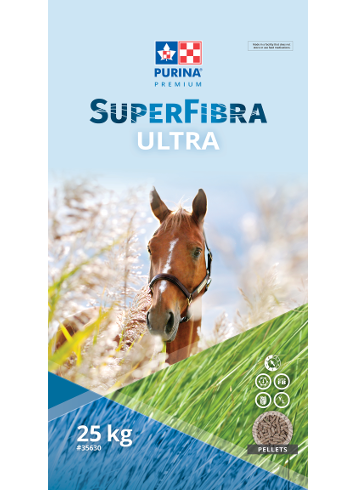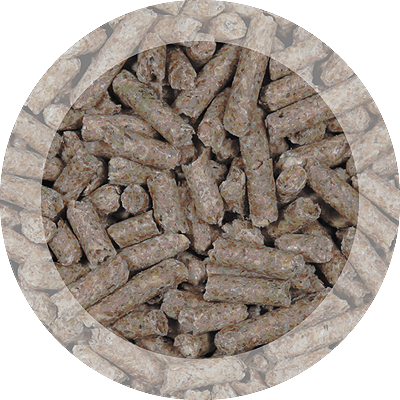
Ultra
#35630 / PremiumFeed for maintenance, exercising horses and more
SuperFibra Ultra is a versatile feed low in sugar/starch (NSC - nonstructural carbohydrates) in a pellet format. SuperFibra Ultra is a complete feed designed to meet the needs of maintenance, exercising, breeding horses and yearlings that require a low sugar/ starch diet. SuperFibra Ultra is formulated with certified quality ingredients and is manufactured exclusively in our specialized and drug-free facility in Strathroy, Ontario.



 Calories/DE
Calories/DE Controlled NSC (sugar + starch)
Controlled NSC (sugar + starch) Super Fibre
Super Fibre Essential Amino Acids
Essential Amino Acids Yeast
Yeast
Characteristics
Contains reduced starch and higher fat and fibre content (commonly referred to as low glycemic)
- Delivers sensible calories (energy) needed for performance and maintaining body condition.
- Helps minimize excitability. Suitable for horses that “tie-up”.
- Proven to effectively regulate glycemic and insulin response.
- Suitable for horses with a history of laminitis, Cushing’s Disease or insulin resistant.
- Helps minimize gut upset (colic) by preventing starch overload in the hindgut.
Contains high pectin and hemicellulose fibre. Does NOT contain economical fibre sources like oat hulls
- A highly fermentable fibre source providing needed calories for performance.
- Helps maintain a healthier hindgut pH and microbial population.
Contains 6% Fat from vegetable sources
- Highly digestible and energy/calorie dense. Less feed required to maintain body condition.
- Clean burning fuel, does not produce lactic acid and spares glycogen levels for enhanced athletic performance.
Contains Yeast Culture
- Improves hindgut fermentation which increases energy, protein and phosphorus utilization.
Contains elevated and added amino acids including Methionine
- Provides building blocks for improved muscle and joint development and milk production.
Feeding rates
SuperFibra Ultra is recommended for performance horses, show horses, breeding horses and yearlings. Feed according to the following table. Individual horses variance may require feeding rate adjustment of plus or minus 15% of amount indicated. Feed in conjunction with water and a minimum of 1% body weight (on a dry matter basis) of a long stemmed forage (hay/pasture). Feed according to the following table, whereby the lower quantity meets minimum vitamin and mineral requirements and the higher quantity meets Purina Superior Recommendations. Ideally, feed enough to achieve desired body condition, and for every kilogram under the recommendation, provide 175 grams of Purina Equilizer (35710). Provide free choice salt. Daily ration should be divided into 2 preferably 3 separate feedings.
Daily amount of Equilibrium SuperFibra Ultra
kg / 100 kg of Body Weight
| Minimum | Purina Superior | |
|---|---|---|
| Maintenance | 0.67 | 1.00 |
| Performance | ||
| Light Exercise | 0.73 | 1.33 |
| Moderate Exercise | 0.82 | 1.50 |
| Intense Exercise | 0.91 | 1.67 |
| Stallions | ||
| Non Breeding | 0.67 | 1.33 |
| Breeding | 0.73 | 1.33 |
| Broodmares | ||
| Gestation | 0.92 | 1.33 |
| Yearlings | ||
| 13 to 18 months | 1.33 | 1.67 |
| 19 months and + | 1.14 | 1.67 |
- Amounts can vary depending on the hay. Purina recommends that you have your hay analyzed and balance your ration accordingly. Also, depending on the hay, Optimal (35720) may be better suited as a supplement than Equilizer (35710).
- If your horse rapidly consumes this feed and/or if hydration status of your horse is questionable, we recommend adding water to this feed or using other measures to ensure an appropriate rate of intake.
- Do not provide more than 0.5% of Body Weight of this feed at one time.
CAUTION
Directions for use must be carefully followed.
Feed is perishable. Store in a dry, well‑ventilated area protected from rodents and insects. Do not feed moldy or insect‑infested feed to animals as it may cause illness, abortion or death.
To optimize the diet
- Purina recommends analyzing your hay and balancing the ration accordingly.
- Feed clean and dust free hay in sufficient amount daily. Feeding poor quality hay or feeding inadequate amounts could cause colic and other digestive upsets.
- Offer source of salt (NaCl) daily as well as plenty of fresh and clean water at all times.
- Make any feed change gradually over a 7 to 10 days period.
- Daily ration should be divided into 2 and preferably 3 separate feedings or more.
- Use a scale to weigh your feed so you know exactly how much your horse is being fed. Do not feed by volume.
- Purina recommends providing a maximum of 0.5% of body weight of this feed at one time.
- These recommendations are intended as a guide. They should be adjusted to variables of management, environment and individual needs. Consult your Cargill Equine Consultant if necessary.
- Follow sound management practices along with optimal preventive veterinary medicine.
Analysis
| Protein | 13.00 % |
| Fat | 6.00 % |
| Fibre | 18.00 % |
| Calcium | 0.85 % |
| Phosphorus | 0.55 % |
| Sodium | 0.60 % |
| Vitamin A | 6500 I.U./kg |
| Vitamin D3 | 1200 I.U./kg |
| Vitamin E | 220 I.U./kg |
| Selenium | 0.30 ppm |
Ingredients
| Nutrients | Ingredients |
|---|---|
| Fibre | Soya Hulls |
| Protein/Amino Acids | Soya Bean Meal, DL-Methionine |
| Starch | Ground Corn, Ground Wheat |
| Fat | Soya Oil |
| Prebiotic | Yeast |
| Probiotic | |
| Vitamins | Vitamin A, Vitamin D3, Vitamin E, Vitamin K, Riboflavin, Niacin, Thiamine, Vitamin B12, Biotin |
| Minerals | Salt (Sodium Chloride), Calcium Carbonate, Calcium Iodate, Copper Sulphate, Ferrous Sulphate, Manganese Oxide, Zinc Oxide, Organic Selenium, Cobalt Carbonate |
| Multi- Attributes | Wheat shorts |
*Ingredients are not in order of their inclusion rate.



